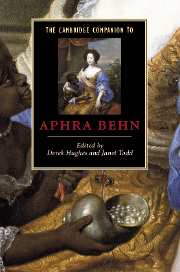Book contents
- Frontmatter
- 1 Aphra Behn: The Documentary Record
- 2 Behn, women, and society
- 3 Aphra Behn and the Restoration theatre
- 4 The political poetry of Aphra Behn
- 5 Behn’s dramatic response to Restoration politics
- 6 Tragedy and tragicomedy
- 7 Behn and the unstable traditions of social comedy
- 8 The Cavalier myth in The Rover
- 9 ‘The story of the heart’: Love-letters between a Noble-Man and his Sister
- 10 Oroonoko: reception, ideology, and narrative strategy
- 11 ‘Others’, slaves, and colonists in Oroonoko
- 12 The short fiction (excluding Oroonoko)
- 13 Pastoral and lyric: Astrea in Arcadia
- 14 Aphra Behn’s French translations
- Further reading
- Index
- Series list
7 - Behn and the unstable traditions of social comedy
Published online by Cambridge University Press: 28 May 2006
- Frontmatter
- 1 Aphra Behn: The Documentary Record
- 2 Behn, women, and society
- 3 Aphra Behn and the Restoration theatre
- 4 The political poetry of Aphra Behn
- 5 Behn’s dramatic response to Restoration politics
- 6 Tragedy and tragicomedy
- 7 Behn and the unstable traditions of social comedy
- 8 The Cavalier myth in The Rover
- 9 ‘The story of the heart’: Love-letters between a Noble-Man and his Sister
- 10 Oroonoko: reception, ideology, and narrative strategy
- 11 ‘Others’, slaves, and colonists in Oroonoko
- 12 The short fiction (excluding Oroonoko)
- 13 Pastoral and lyric: Astrea in Arcadia
- 14 Aphra Behn’s French translations
- Further reading
- Index
- Series list
Summary
As the first professional woman dramatist in England, Aphra Behn offers radically different perspectives from her male counterparts on the love intrigues, wit battles and property-mongering satire that are the stock-in-trade of Restoration social comedy. While most critics of the period now acknowledge that Behn was one of the most artistically and commercially successful playwrights of the 1670s and 1680s, the reasons for her success and, to some extent, the nature and significance of her achievement remain matters of debate. Some commentators argue that Behn champions women's right to choose their marriage partners, and consequently identify her as a seventeenth-century feminist; other scholars maintain that she offers a much darker condemnation of the antifeminism and male libertinism of her time; and still others emphasize the ambiguities of her position as a woman writer in a misogynistic society. There is, paradoxically, much to be said for all of these views: comedies such as The Rover (part one, 1677; part two 1681), Sir Patient Fancy (1678), The Feign'd Curtizans (1679), The City-Heiress (1682) and The Luckey Chance (1686) dramatize the allure (and difficulties) of women exercising their choices in love. Even as Behn criticizes the antifeminism endemic to a patrilineal society, she reminds her audiences that women have limited options and limited room to manoeuvre.
- Type
- Chapter
- Information
- The Cambridge Companion to Aphra Behn , pp. 98 - 117Publisher: Cambridge University PressPrint publication year: 2004
- 1
- Cited by

